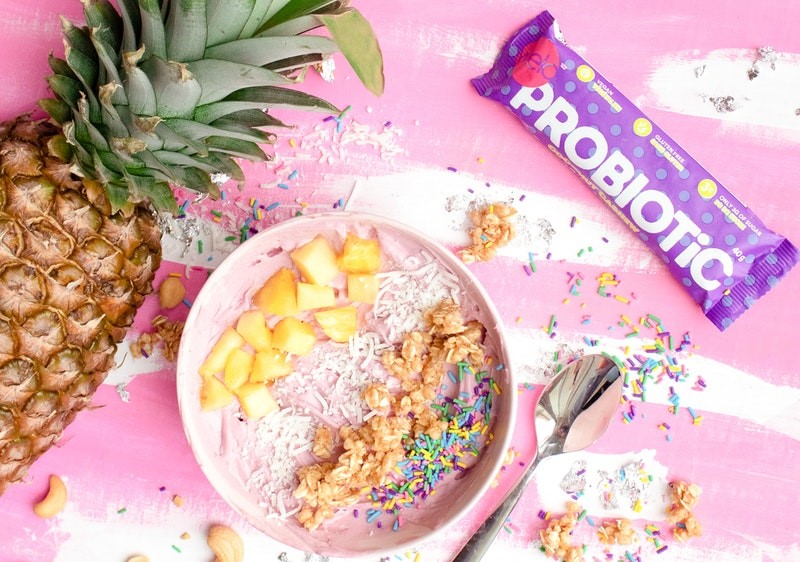What do probiotics do
Probiotics are live microorganisms that are believed to have a beneficial role in supporting the digestive system, balancing the intestinal flora.
They are recommended to be ingested after an illness that disrupts the gut’s functions. Also, they are prescribed by doctors for patients who underwent an antibiotic treatment because these will help the stomach lining and prevent the apparition of ulcers.
We are born with these friendly bacteria in our guts. Bacteroides, Bifidobacterium, and Lactobacillus are passed from mother to baby at birth, being picked on the way through the birth canal.
How do probiotics work
Probiotics repopulate the gut with good bacteria when harmful bacteria overtake these. Harmful bacteria grow in the intestines due to:
- Unhealthy lifestyle – stress, poor sleeping patterns
- Poor diet – unbalanced meals taken at various times during the day
- Antibiotic treatment – antibiotics kill good microorganisms along with harmful ones
- Certain drugs – some medicines can hurt the intestinal flora.
- Alcohol – too much drinking can affect the stomach lining
- Smoking – can negatively impact a healthy gut.
- Depression and anxiety – can cause a shift in the intestinal balance
- Pollution – chemicals and other environmental factors can affect the gut negatively
If taken according to the health specialist’s recommendation and following the label instructions, probiotics help the gut flora regeneration.
The immune system receives a boost of friendly bacteria that will then aid in stopping infections and act as preventive measures against intestinal illnesses like diarrhoea or helicobacter pylori.

Signs probiotics are working
As with every treatment, the signs that this is working might not be seen immediately. The first signs will appear differently according to a person’s metabolism, body weight, age and lifestyle changes.
Starting a probiotic treatment needs to be paired with some diet changes. In a short time, you may notice:
- Reduced bloating
- The sensation of being heavy slowly diminishes
- Toilet trips are reduced
- The disappearance of some pains and aches around the stomach area
- Improved quality of sleep
- Regained energy and the fatigue sensation is gradually lifting
- Possible weight loss (not everyone will experience this)
- Some will experience an effect on their skin-soothing action on eczema
How long for probiotics to work highly depends on the type of health issue and the required treatment. Their action is believed to start within hours of ingesting the first capsules; however, the effects will be seen over the next few days.
Best time to take probiotics
Your doctor or pharmacist will tell you how and when to take your supplements. Generally, probiotics are recommended to be taken once daily, in the morning, before breakfast.
More important than the time to take the probiotics is to remember to take them daily and follow a set pattern.
Probiotics – side effects
Probiotics are food supplements, not medicines. They are safe to take by people of all ages (there are probiotic supplements specially designed for children), and only a few non-harmful side effects were noticed by some users:
- Bloating
- Flatulence
Skin irritation and itchiness might also occur in rare cases.
By discussing these side effects with your healthcare specialist and following the advice received, things can be remediated quickly. There might be small adjustments in the number of probiotics contained in your treatment or changes related to medication already taken.

Who should not take probiotics
Although taking probiotics is safe for the wider population, in some cases, doctors may recommend avoiding such treatments:
- Before a surgery
- People suffering from pancreatitis
- People with open wounds (after accidents or surgery)
- Immunosuppressed patients
- Children with short bowel syndrome
Pregnant women and breastfeeding mothers must discuss this with their healthcare specialist before taking food supplements.
How long should you take probiotics for
Before starting to take probiotics, your pharmacist will discuss with you the length required for your specific treatment.
Depending on what you want to achieve in health terms, your treatment will be spread over different periods of time in relation to other people taking probiotics.
The most common treatment takes 4 weeks, with some going over 12 weeks.
What happens when you stop taking probiotics
When probiotics are taken at the doctor’s recommendation, the decision to slowly reduce the dose might be suggested for some patients, such as the ones with Crohn’s disease or IBS.
Stopping the treatment abruptly might leave you with side effects like flatulence or diarrhoea. These will pass quickly.
When the whole probiotic treatment course is finished naturally, your body won’t show any signs. Everything will run smoothly, just as per usual.
Are probiotics good for you?
Like any other food supplement, probiotics can be good for you if you need to boost your body’s natural functions. You might not need added supplements with probiotics if your diet contains natural products like :
- Bananas (prebiotics)
- Plain yoghurt (preferably without any added sugar or sweeteners)
- Kefir
- Milk
- Pickles
- Miso
- Raw cheese
Probiotics help the equilibrium of a healthy gut and greatly aid the immune system. They are in no way harmful and don’t create addiction, being safe to use over a prolonged period of time.
They can relieve a repeated accumulation of gas in the intestines, help constipation and diarrhoea, reduce inflammation inside the body, aid digestion by eliminating the unpleasant fullness sensation, protect the colon and the stomach lining, and promote rising numbers in the friendly gut bacteria.

Can probiotics help nail fungus?
Amongst the many beneficial effects of probiotic food supplements, certain cases showed their positive effect on treating fungal infections. Taking probiotics for toenail fungus was studied and backed up by scientists that published their experimental trials in the Journal of Microbiological Methods.
The probiotics work from inside to prevent fungal infections, thus showing positive effects on the outside of your nails, for example.
Related article

Where to buy probiotics
Supplements containing probiotics can be found in pharmacies, health shops, online on producers’ websites and even in online shops like Amazon, eBay or Walmart.
If you decide to start a probiotic treatment and are unsure of the dosage needed, discuss with your doctor or a pharmacist your reason for starting a probiotic treatment, and they will suggest the best type of supplement for your situation: powder, capsule or liquid.




![Best alternatives to Athletic Greens [2025 Update] Green Smoothie drink](https://cellregenerate.com/wp-content/uploads/2021/01/Green-Smoothie-drink-150x150.jpg)








